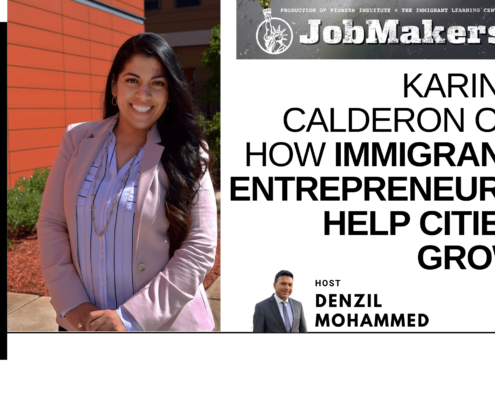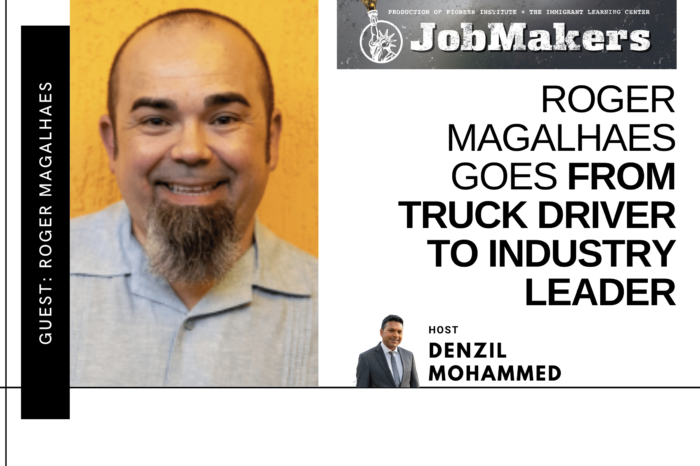Roger Magalhaes Goes from Truck Driver to Industry Leader
/in Economic Opportunity, Featured, JobMakers /by Editorial StaffThis week on JobMakers, host Denzil Mohammed talks with Roger Magalhaes, immigrant from Brazil and founder of the firms Shades in Place window treatment installation and Trading Up Consulting, in Franklin, Massachusetts. They discuss how Roger built his successful business from the ground up, took advantage of every opportunity here in the U.S. to advance, and became one of the most influential leaders in his field. He’s even now training his competitors. Roger is also the 2022 Barry M. Portnoy Immigrant Entrepreneur Awardee for Business Growth, an annual honor bestowed by The Immigrant Learning Center, co-producer of this podcast. Now an American citizen, Roger shares his belief that immigrants must “Americanize” in order to fulfil their potential and have the biggest impact, a debatable view but one rooted in his own experience and success, as you’ll hear more about in this week’s JobMakers.
Guest:
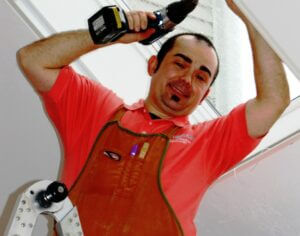
Roger Magalhaes was born in Sao Paulo, Brazil, where he studied robotics in tech school and was a maintenance supervisor at a small manufacturing facility before coming to America in 2000. Here, he worked at a car wash and drove trucks before opening Shades In Place Inc. in 2006, a home-based window treatment installation company. He holds several certifications for various leading product lines such as Hunter Douglas, Somfy, Norman Shutters, Lutron and proprietary installation techniques, and attended the Custom Home Furnishing Academy. He has been a member of the Window Coverings Association of America since 2006, and is a Director-at-Large. In 2020, he was named one of seven Top Window Fashion Influencers by Window Fashion Vision magazine, and is a regular columnist, as well as a presenter at the International Window Coverings Expo, and the installation instructor for the Window Fashion Certified Professional FastTRACK program.
Get new episodes of JobMakers in your inbox!
Read a Transcript of This Episode
Please excuse typos.
Denzil Mohammed:
I’m Denzil Mohammed, welcome to Jobmakers.
Denzil Mohammed:
If you move to say France, do you think you’ll be perceived as French? When you move to the United States, you become an American part of that country. That for hundreds of years has attracted people from a staggering array of nations, creating something diverse, entrepreneurial, constantly changing and beautiful. And what’s the main reason people come here. Opportunity for Roger Magalhaes, immigrant from Brazil and founder of Shades in Place, a window treatment installation firm and trading a consulting firm in Franklin, Massachusetts. He didn’t even know just how much opportunity there was in the United States to advance and progress. So when the opportunity to start installing shades as a business occurred, he seized on it today. He’s one of the most influential leaders in his field, which doesn’t even have a school where you can learn the trade, his business, he built from the ground up and never missed an opportunity to learn and improve today. He’s teaching his competitors by the way, Roger Magalhaes is also the 2022 Barry M Portnoy immigrant entrepreneur awardee for business growth an annual honor by the Immigrant Learning Center, co-producer of this podcast. Check it out on YouTube. Roger now is an American citizen. He believes immigrants must quote Americanize in order to fulfill their potential and have the biggest impact, a debatable view for sure, but one rooted in his own experience and success. As you more about in this week’s Jobmakers.
Denzil Mohammed:
Roger Magalhaes, founder of Shades in Place and Trading Consulting, welcome to the Jobmakers podcast. How are you?
Roger Magalhaes:
Doing good, thanks so much for having me on. I appreciate it.
Denzil Mohammed:
So tell us what’s your business?
Roger Magalhaes:
So my business, my 30-second elevator pitch, I say that I’m a shady business. Basically, so I started out just installing window treatments for for retail sellers. And eventually I start selling them as well. And 15 years later I developed my techniques and knowhow. And now I also teach how to install the best way, how to form new installers, because we don’t have the, any industry.
Denzil Mohammed:
So you basically almost like created a virtual textbook for how to do this it’s shades installation, right?
Roger Magalhaes:
Basically. Yes. And my friends say, now I teach my competition how to be me.
Denzil Mohammed:
Oh, that’s hilarious. So I know you sort of stumbled into this kind of business. Why do you find this interesting or something that you really wanna develop?
Roger Magalhaes:
So what happened was I bought my house and I rehabbed over the weekends and, you know, after after hours after my job, and then I really liked the hands on and construction and break things apart and put it back together. And I kind of, well, I really like to develop more into these, but there is no job that’s gonna go in and out on the same day. So thinking like, well, if I start a company to do whatever kind of work and I need to replace flooring, or I need to paint walls or whatever, you know, activity I need to do in the house, it’s not gonna be done in one day. So I did a wanna leave my job as a truck driver to start something that I, I would’ve come and to Mrs. Jones and say, Mrs. Jones, I started your job today, but then you gotta be without for, until Thursday when it, my next day off so I can come and finish. So it, it didn’t make it sense to, to do anything like that, something that kinda in and in a house that I can have it done in a day. So I won’t kinda have to come back because I didn’t finish on the same day and I can fill, you know, my days off between driving trucks and that’s way I started out. But you don’t know what you don’t know. Right,
Denzil Mohammed:
Right. And now you’re doing even yeah. But your story with entrepreneurship began all the way back in Brazil when you were a boy. Right?
Roger Magalhaes:
Pretty much. Yeah. As I said, I’m a, I’m a workaholic. So I need to, you know, since early days I just, I like to keep doing things I don’t like just to be sitting around. And then let’s call my first business, I guess at age six I have two twin cousins that I really loved them and they’re kinda six probably four or five years older than me. So they were my role models when you were a little kid and they, they like to fix bicycles. They, they were always doing something, you know, and at one point they have shine shoe boxes and they were just, you know, going around on the streets and doing it. And I say, can you have one of your friends to build me shoe shine box? So I can go around, you know, and asked my, the neighbors here.
Roger Magalhaes:
And he said, yeah, sure. You know, six years old, what the heck is gonna do with that? So one of his friends built the shine shoebox and gave it to me and I would go around the, the neighbors and ask them. But obviously it was different because the, the husbands were, they were not home. It was just the wives that would give me just the shoes and say here. So I really like when you kind, you, you knock on the, on the shoebox and a step, and then they switch feet and then switch legs. So you can do it. And I couldn’t do that way because there was nobody wearing the shoes at that time. But in any event I made some money and I liked it. And that was really my first entrepreneur thing.
Denzil Mohammed:
When you moved to the, it was around 2000, right?
Roger Magalhaes:
Correct.
Denzil Mohammed:
And did you have the intention of thinking that you were gonna be able to start a business in the us at that time? No.
Roger Magalhaes:
No. My, my, my plan was more, more or less learning English. That, that was one of the main reasons. And because we had a, a strong economy and I said, well, maybe I’ll work a couple, a few years here, save up some money. And then I’ll go back to Brazil eventually. And then I’ll open a business there because I always wanted to have a business somehow, you know? And I said, well, I I’ll be capitalized and go back. And I’ll, I’ll open some sort of a business. And then the pandemic came and I said, well, maybe I, this might be the opportunity just to, to flip it, you know, and kind of close it because in my mind it was like who the heck’s ever gonna buy shades in the middle of a pandemic pandemic shades should be on the bottom of the list, you know with priorities and ended up being exactly the opposite because everybody was home.
Roger Magalhaes:
Everybody, nobody was sick. Everybody was just trapped inside the house, you know, and they kind of, we need to spend the energy we have here. We’re not traveling. People were working for home, so income was coming and everybody started remodeling homes and fixing, changing rooms into offices. And next thing you know, we are busy as ever been, you know at the same time I was teaching already conventions and seminars and got that, got real intensified because nobody went to the real conventions. And then because everybody was home, oh, let’s do a live, let’s do a seminar, let’s do a webinar. And then I start getting way more requests to, to share knowledge. And you start getting why you think this is happening, what we you can do for, you know, becoming more influencer to the industry. And then in September of 2020 driving to a job on the Berkshires, and then thinking, I said, well, I really built this from really blood sweating tears.
Roger Magalhaes:
I don’t wanna just give it up. And that was when trading app came on. And I said, well, I actually could transition from really hands on work and more physical into training, new people and kind of passing on the knowledge, keeping my connections. It was really how the whole thing started with trading out. And then at the same time, because it was so busy with shades and place and high demand. I say, I just cannot just close it. As I originally thought, I guess I was just gonna bring people in, in and train them so I can be the lead on both companies. I can have people working for me at the same time. I can pass the know into other to other people as well. And that’s really what we are right now.
Denzil Mohammed:
And so your showroom became a workroom.
Roger Magalhaes:
Yeah. We don’t have a showroom anymore. We’re gonna turn the showroom into more a, a school facility. So I develop different types of windows so we can different applications. So I can shoot classes and shoot videos and explain how things should be done. And what is the difficult you’re gonna see each window, what kind of products you can use for certain applications. And that became really the the school.
Denzil Mohammed:
And so your, your reputation goes well beyond Massachusetts. And you’re requested in, in several states across the country, even though basically all the way down to Florida take us back to when you first moved here and, and, you know, coming from, from Brazil, the economy has started to do better, but it must have been a, a real ch change for you.
Roger Magalhaes:
Oh, definitely. First, the, the weather, the language barrier being away from family, I do only have one cousin here, but still with the, you, it’s not the whole family, you know, in culture, the way things, people do things. And even new England is a little more conservative than the rest of the country for the most part. So all of those things I had to adjust, and obviously it, it takes time and it was a big learning curve.
Denzil Mohammed:
And you mentioned earlier that, that you’re, you’re trading your competition, which I, I find so, so interesting. You have found very creative ways to give back and to promote the success of other entrepreneurs. Can you describe some of those initiatives that you have and what’s the, what impact you’ve had?
Roger Magalhaes:
Right. I really believe I know a lot of people, they, they don’t share anything because they are so afraid that if they share what they know, they gonna be displaced, somebody else gonna take over. And I truly believe it is totally the opposite. The more you share, the more people rely on you because they really see you as a trust resource. So I’m not the least afraid of losing work for the competition. As a matter of fact, I think is it is great because the competition can see how you do, you can improve the whole experience for everyone overall. So in 2004 lemme see if I can remember this correct. In 14, I started a Facebook group called free speech window covering pros for that reason, just to share knowledge, because that was pretty much how I learned the business. There’s no school for what we do. So you’re just learning by shadowing someone by going to training, by going to seminars making a friend that kind of is more seasoned than you. So you can call, you know, a body up and ask questions. And that was really how I learned. It became really a really great resources that we have over a thousand members. Now, it, it pays off so hugely it it’s unbelievable.
Denzil Mohammed:
Wow. That is incredible. One question for you as you’re from Brazil, you know, we’ve done research on Brazilians and their self-employment rates and they’ve Brazilians have the highest rates of self-employment of entrepreneurship in the greater Boston area.
Roger Magalhaes:
Is that right?
Denzil Mohammed:
I mean, that’s both incorporated and unincorporated the businesses, but why do you think that is
Roger Magalhaes:
What I really thing it is? First we are very creative. We are creative because we didn’t have the resources because everything is so scarce. We just need to be creative to survive. That’s really instinct mode to get a, a survival mode, really. And then when we get here and I’m talking back in Brazil, and then we get here and we see the opportunities here, and we see that it is so abundant here, that pretty much that’s market for everything. And then these people start saying, well, you know what? I already had the second chance just to be here, let me use my, my knowledge or my instinct and kind of move forward. And they, I think that’s what it is. We just see the opportunities that we didn’t see back home. And we just run with them.
Denzil Mohammed:
It’s funny that you mentioned that because you know, someone, you and I know Y KA Barwick who has a business called clean green on the Cape, right. You know, it was the same thing for her, especially coming from like a communist country to Czech repo the Czech Republic and, and just seeing how much opportunity was here. And, you know, as did you, you grabbed those opportunities and then you same thing with her and you all expanded. Even during the pandemic, she opened a new business and moving yoga, you opened your consulting business, you went, you know, you went online, you, you were all over zoom, you were trading. I seeing videos all over the place, instructions and things, things like that. I mean, that’s really something that, that it’s it, that’s a message we wanna get out with this podcast. Really?
Roger Magalhaes:
Yeah. I appreciate
Denzil Mohammed:
Immigrants. Come here and grab opportunities and make and create jobs.
Roger Magalhaes:
I’m no special. I know, you know, I don’t have privilege is, or anything is just hard work. But one thing that I really think is extremely important. Don’t try to run your life here, the way you run your life in your own country. So you come here, you need to learn the language. You need to get used to the customs, to the culture, to the way people live here. Because you know, you can live here for 50 years, but you are still someone that came, you know, you, you still an immigrant, you still a foreigner, even 50 years later, even as an American citizen, for the lack of a better word, you know, a lot of people don’t see that they wanna do that way. You know, and that’s what I think people miss the opportunity to grow even bigger, because I can tell from everything that I’ve done and all success, I have achieved. The first thing that comes to a lot of the comments from people say, Roger, we really appreciate that. You respect our culture. You respect the way things are. You learn the language, you really did things the way you’re supposed to be done. And that’s why you’re successful because you got the respect from your own community. You got respect from the Americans because they saw you respect the country.
Denzil Mohammed:
I, I feel as though there’s, there’s a subtle dig at some other immigrants in what you’re saying, that, you know, some, perhaps some don’t acclimatize and therefore that holds them back.
Roger Magalhaes:
I don’t know exactly what it is or even between Brazilians. You know, some Brazilians are very successful between the community, but they don’t expand wider because they feel like they wanna stay with their own community. And I think this is wrong. You really need to cater to everyone and open, you know, to more cultures and all of that. But you need to be for lack of a better word, Americanized, you know, you, you, your culture comes second. The American culture always gonna come first. You know, you are in that, you are in that game, you are in that playing field. You know, you put your Brazilians estimate or your, you know, whatever culture you have in, but it should not be the primary culture. And that’s what I think some people missed the point.
Denzil Mohammed:
We do the running man here, not the soba, right. So
Roger Magalhaes:
Exactly we can, we can play a couple Sobas, you know, between the whole night, but it shouldn’t be the soba night.
Denzil Mohammed:
And so finally you’ve been given, you know, tremendous opportunity and you’ve run with it. You have been successful, enabled other people to be successful. How do you feel about the country that, that took you in and allowed you to thrive in this way? The United States?
Roger Magalhaes:
It, it is very ironic because when I was in Brazil, I never planned to be in the us. And then eventually I came and I saw the opportunities and I saw that, you know pretty much whatever you do here, there’s a market for it. You know, and people respect you. They may not agree with you, but they still respect your point of view. And the opportunities are just here regardless what you wanna do that’s is always a market for it. And I respect that it there’s, there’s a reason why the us is the biggest market on the planet, because the opportunity is just incredible. I cannot be more thankful now. And as a matter of fact, I’m a American citizen. So that may say that I really in joy and appreciate this country.
Denzil Mohammed:
That was very nicely said, Roger Magalhaes, founder of Shades in Place and Trading Up consulting. Thank you for joining us in Jobmakers and sharing your story.
Roger Magalhaes:
I really appreciate it. Thank you. I really appreciate the opportunity.
Denzil Mohammed:
Jobmakers is a weekly podcast about immigrant entrepreneurship and contribution produced by pioneer Institute of think tank in Boston and the immigrant learning center in Malden, Massachusetts, a not for profit that gives immigrants a voice. Thanks for joining us for this week’s powerful story of immigrant entrepreneurship. Remember, you can subscribe to job makers and apple podcast, Spotify, or wherever you get your podcasts. And please give us some star, see you next Thursday at noon for another jobmakers.
Recent Episodes:
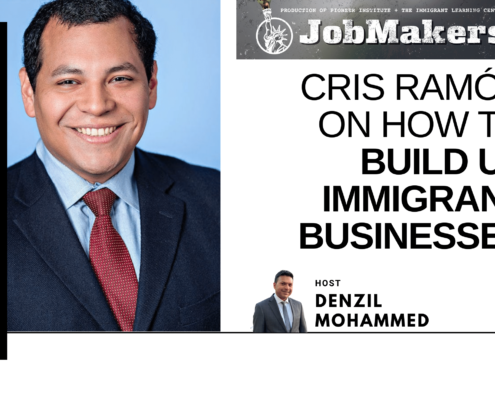
Cris Ramón on How to Build Up Immigrant Businesses
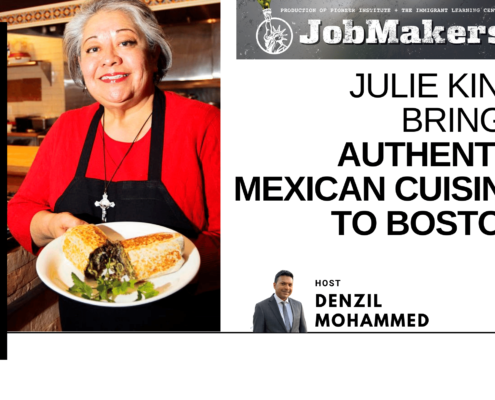
Julie King Brings Authentic Mexican Cuisine to Boston
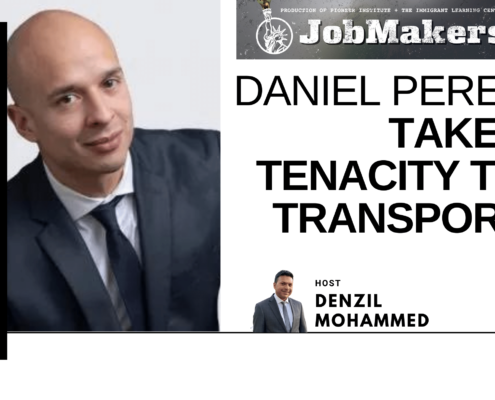
Daniel Perez Takes Tenacity to Transport
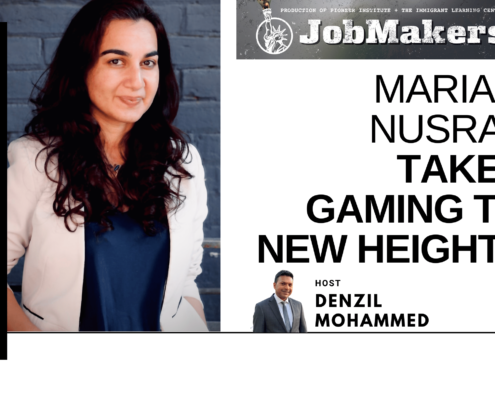
Mariam Nusrat Takes Gaming to New Heights
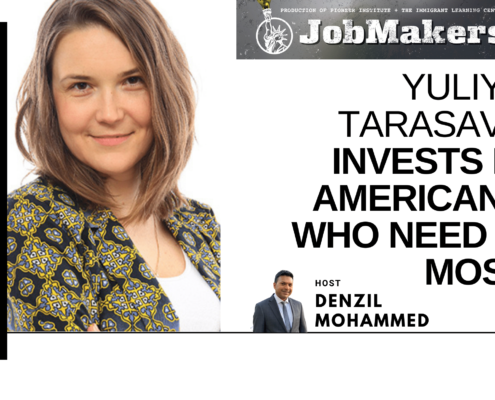
Yuliya Tarasava Invests In Americans Who Need It Most
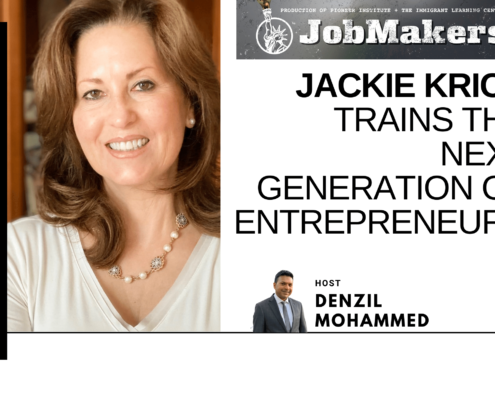
Jackie Krick Trains the Next Generation of Entrepreneurs
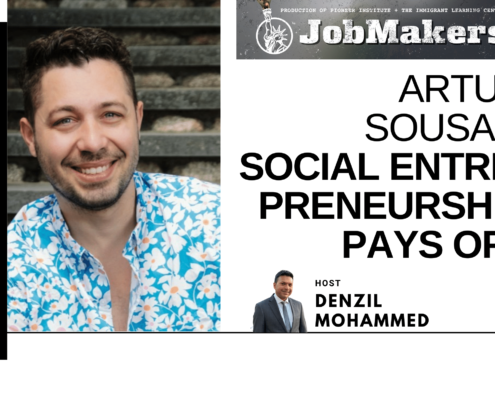
Artur Sousa’s Social Entrepreneurship Pays Off
